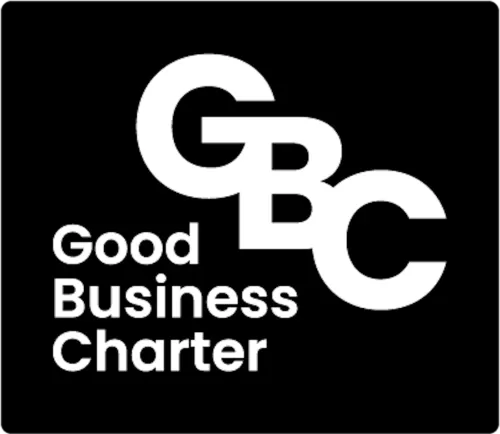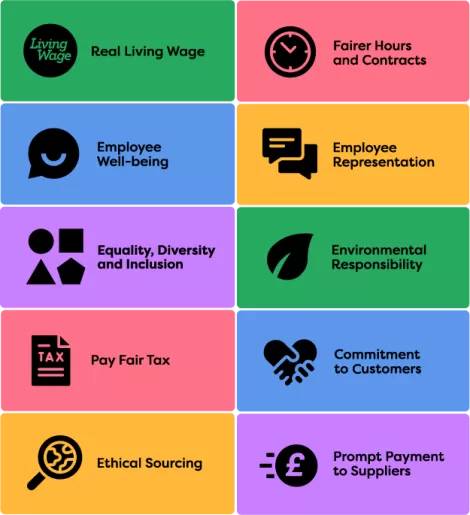The Good Business Charter is an accreditation scheme for responsible business behaviour which launched in 2020.
Its aim is to recognise, encourage and champion responsible business behaviour by bringing together different standards into a benchmark for ‘good business’ which covers care for employees, suppliers, customers and the environment whilst paying fair share of taxes.


The Good Business Charter team work closely with the TUC (Trades Union Congress), IoD (Institute of Directors) and FSB (Federation of Small Businesses) among others to ensure that the voices of both businesses and workers are heard. In 2021 it launched a streamlined version of the accreditation which is accessible to organisations with 50 employees or less and it has members from a range of sectors and sizes including Aviva, Richer Sounds, City of York Council and Joseph Rowntree Foundation.
A company must meet commitments in each of these 10 areas to receive GBC accreditation (9 for charities/public sector) and the good news is that the Living Wage accreditation is one of these 10 commitments below.
Why is it needed and why does it matter?
According to Re-generate (2020), 53% of people favour brands doing good in the world, but 55% of people say they cannot tell the difference between those acting responsibly and those who are not.
Many people believe in a fairer society and want to work for and purchase from organisations that are ethical and responsible. At the current time, it is almost impossible to know which organisations are operating ethnically and responsibly across all areas of business. The Good Business Charter provides a clear accreditation for all stakeholders to recognise those businesses operating responsibly in these areas.
The goal of the Good Business Charter is to gain a critical mass of accredited companies of all sizes, and from all sectors, and grow the brand's recognition amongst consumers, employees, investors and other stakeholders.
So far over 1,000 organisations have signed up in the years since it launched, and the community of GBC employers grows, sharing best practice on how to embed their responsible business behaviour throughout every area of operation.
What is the impact?
The Good Business Charter has the potential to change business behaviour which will have a positive impact on all stakeholders including employees, customers and suppliers. Employees earning under the real Living Wage will see a salary uplift and those on zero hours will have important guarantees on stability of their hours. These are tangible examples of the positive impact of businesses raising their standards in order to be GBC accredited.
The GBC's aim is to create a fairer society by promoting this accreditation scheme through encouraging businesses to pay people a fair wage for a fair day’s work, as well as pay their UK taxes not only in accordance with, but in the spirit of national legislation to ensure that revenue is reinvested back into the country’s education, healthcare, transport and other areas. This will benefit both current and future employees.
Ethical sourcing and prompt payment to suppliers ensures smaller companies are not exploited and appropriate behaviour towards customers all make for a fairer society where everyone is well informed of the choices they are making and the contribution their custom brings.




